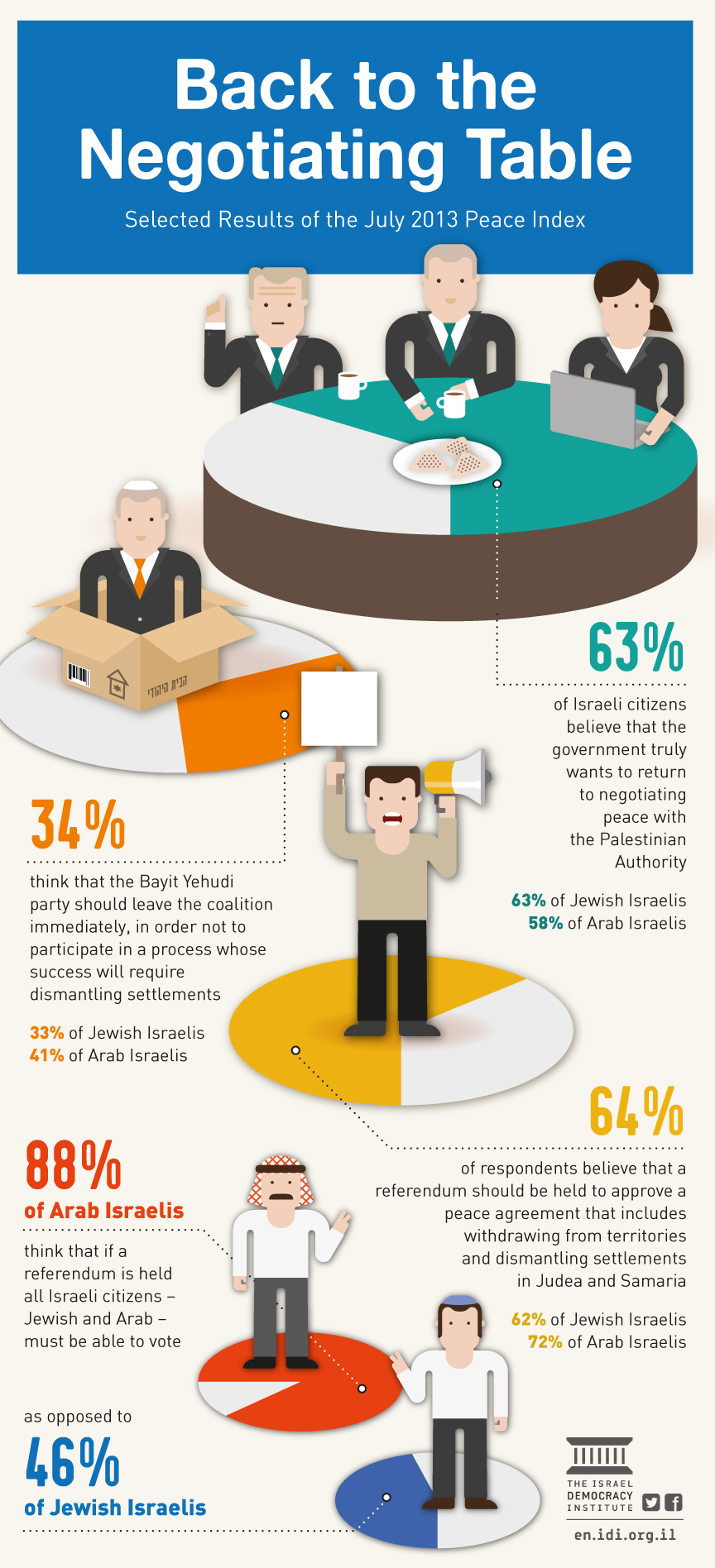Majority of Israeli Jews Oppose Withdrawal to '67 Borders with Land Swaps; Large Majority of Israelis Favor Peace Referendum
Majority of Israeli Jews Oppose Withdrawal to '67 Borders with Land Swaps Even in Peace Deal with Demilitarized Palestinian State, End of Conflict 62% of Israeli Jews, 72% of Israeli Arabs Favor a Referendum for Peace Treaty Requiring Dismantling of Settlements
Majority of Israeli Jews Oppose Withdrawal to '67 Borders with Land Swaps Even in Peace Deal with Demilitarized Palestinian State, End of Conflict
62% of Israeli Jews, 72% of Israeli Arabs Favor a Referendum for Peace Treaty Requiring Dismantling of Settlements
Tuesday, 6 August 2013, Israel Democracy Institute, 4 Pinsker St., Jerusalem - With long-awaited, US-sponsored peace talks underway and the requirement for a public referendum in Israel on any peace deal being hotly debated, the Israel Democracy Institute (IDI) and Tel Aviv University release the results of their latest monthly Peace Index poll.
Israelis were asked their opinion about peace negotiations.
- Prospects for Success of US-sponsored Peace Talks: 79% of Jewish Israelis think the new round of negotiations have a low chance of success of yielding a peace agreement, while 18% believe they have a high chance of succeeding. 41% of Arab Israelis think there is a low chance of success, and 47% believe there is a high chance.
- Sincerity of the Sides: 63% of Israeli Jews and 58% of Israeli Arabs believe the Israeli government is truly interested in returning to the negotiating table. 85% of Israeli Arabs believe that the Palestinian Authority is truly interested in returning to peace negotiations, but only 29% of Israeli Jews agree.
- Trust in Netanyahu on Security: 60% of Israeli Jews trust Netanyahu to conduct negotiations in a way that safeguards Israel's security, while 37% do not. 29% of Israeli Arabs trust him to do so, and 64% do not.
- Trust in Netanyahu's Ability to Finalize an Agreement: 48% of Jewish respondents trust Netanyahu to conduct negotiations in a way such that, to the extent that it depends on Israel, a peace agreement will be signed, while 47% do not trust him in this regard. 32% of Arab respondents trust Netanyahu in this regard, while 59% do not.
- Support for Concessions: Under the conditions of a permanent peace agreement with security arrangements, a demilitarized Palestinian state, international guarantees, and a Palestinian declaration of the end of conflict, 77% of Israeli Jews oppose recognition of the Palestinian "right of return" involving the return of a small number of refugees and financial compensation for the rest; 63% oppose withdrawal to the 1967 borders with land swaps; 58% oppose dismantling settlements while leaving Ariel, Maale Adumim, and the Gush Etzion bloc intact; and 50% oppose transferring Arab neighborhoods in Jerusalem to the Palestinian Authority along with a special arrangement for the Holy Places.
- Coalition Politics
- Bayit Yehudi - Leave or Stay? 51% of Jewish Israelis do not believe that the Bayit Yehudi party headed by Naftali Bennett should immediately leave the coalition in order to not participate in a process which, if successful, will require dismantling settlements, while 33% believe they should. Among Bayit Yehudi voters, 49% are against quitting, and 46% are in favor.
- Labor - Join or Remain in Opposition? 48% of the Jewish public and 71% of the Arab public think the Labor party should immediately join the Netanyahu government in order to support the peace process from within, while 36% of the Jewish public and 9% of the Arab public think they should not.
Israelis were polled on their attitude towards a public referendum.
- The Need for a Referendum: 62% of Jewish Israelis and 72% of Arab Israelis believe that a referendum is necessary if a peace agreement is reached that includes a withdrawal from Judea and Samaria and an evacuation of settlements, while 34% of Jewish Israelis and 20% of Arab Israelis believe there is no need and such a decision should be left to the the government and Knesset.
- Participation in a Referendum: 88% of Israeli Arabs and 46% of Israeli Jews think that all Israeli citizens should vote in such a referendum, while 4% of Israeli Arabs and 49% of Israeli Jews think that the vote should be limited to Jewish citizens only.
- Referendum Results: If a referendum were held today on a peace agreement including withdrawal from Judea and Samaria and an evacuation of settlements, 58% of Jewish respondents and 33% of Arab respondents believe the agreement would be rejected by the people; 29% of Jewish respondents and 58% of Arab respondents believe it would win a majority.
Israelis were asked their thoughts regarding the recent elections for the Chief Rabbi.
- Clean vs. Corrupt: 42% of Israeli Jews rate the elections for Chief Rabbi as corrupt, while 23% rate them as midway between clean and corrupt and 12% rate them as clean.
- Effect of Election Results on the Rabbinate: 31% of the Jewish public believe the results of the elections will have no effect on the status of the Chief Rabbinate, while 27% believe they will be weakened and 19% believe they will be strengthened.
This survey, conducted July 28 - 30, 2013, included 602 respondents who constitute a representative sample of the adult population of Israel. The measurement error for a sample of this size is 4.5%.
The full results of the Peace Index are available on IDI's Peace Index website. An infographic summarizing key points of this month's survey is available for use on the condition that it is used in full.
For more information or to schedule an interview with Peace Index Co-Director Prof. Tamar Hermann, contact:
Yehoshua Oz
Director of International Communications
press@idi.org.il

